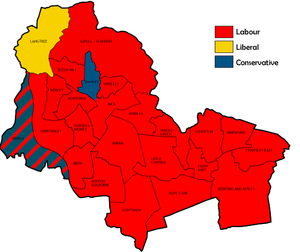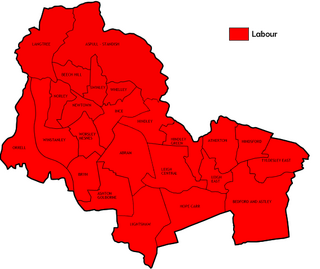
Elections to Wigan Council were held on 7 May 1998. One third of the council was up for election. Following the previous election there had been three by-elections held—in Aspull-Standish, Ince and Hope Carr—with all three successfully defended by Labour.

Elections to Wigan Council were held on 6 May 1999. One-third of the council was up for election. Prior to the election, the Liberal Democrats had gained the seat being fought in Beech Hill from Labour in a by-election, and long-time Labour councillor for Atherton, Jack Sumner, had defected to independent.

Elections to Wigan Council were held on 4 May 2000. One-third of the council was up for election, as well as an extra vacancy in Norley - both of which were uncontested. Since the election, there had been a by-election in which the Liberal Democrats gained the seat being fought in Hindsford from Labour.

Elections to Wigan Council were held on 1 May 2003 with one-third of the council was up for election. Prior to the election, there had been two vacancies in Leigh Central, with Labour winning a by-election in June and the seat being fought in this election filled unopposed by Barbara Jarvis.

The 1973 Wigan Council elections for the First Wigan Metropolitan Borough Council were held on 10 May 1973, with the entirety of the 72 seat council - three seats for each of the 24 wards - up for vote. It was the first council election as the newly formed metropolitan borough under a new constitution. The Local Government Act 1972 stipulated that the elected members were to shadow and eventually take over from the predecessor corporation on 1 April 1974. The order in which the councillors were elected dictated their term serving, with third-place candidates serving two years and up for re-election in 1975, second-placed three years expiring in 1976 and 1st-placed five years until 1978.

Elections to Wigan Council were held on 4 May 1878, with one third of the council up for election as well as vacancies in Ward 2 and 17. Previous to the election, a Labour councillor in Ward 9 defected to become an Independent Labour, reducing Labour's majority to 38. This seat was up for vote and became the only Labour gain of the night, as they suffered five losses to the Conservatives, and their majority reduced to 30 - half of what it was in 1973. The election seen a first of all wards being contested, with turnout rising marginally to 34.7%.

Elections to Wigan Council were held on 3 May 1979, with one third of the council up for vote as well as an extra vacancy in Ward 22. The election seen Labour strengthening their grip, with six gains - mostly in the wards they lost seats in at the 1975 election - and one loss. All but one of the gains were from the Conservatives, with the other being from the Liberal's sole seat in Ward 14. A Liberal gain in Ward 15 from Labour kept them represented on the council. Owing to general election on the same day, turnout was significantly up, to 75.7% and all wards were contested - a continuation of the feat started last election.

Elections to the Wigan Council were held on Thursday, 6 May 1982, with one third of the council up for election. The newly formed Alliance made three gains, replacing the Conservatives as the main opposition to Labour. The Alliance massively increased upon the Liberals' past participation, contesting every ward, in marked contrast to a year in which candidate variety fell to a low, with only the former Labour councillor, standing again as Independent Labour in Hindley ward, not representing the three aforementioned choices. Overall turnout was down 2.6% to 33.6%.

Elections to the Wigan Council were held on Thursday, 5 May 1983, with one third of the council up for election. The election seen only the main three parties contesting for the first time and one gain in Tyldesley East with Alliance winning their seventh seat from Labour. The Conservatives, contesting a low of seventeen wards, managed their lowest voter share since the council's creation. Overall turnout rose to a relative high of 39.1%.

Elections to the Wigan council were held on Thursday, 3 May 1984, with one third of the seats up for vote. Three wards – Abram, Hindley and Lightshaw – were unopposed, leaving only twenty one of the twenty four wards going to vote – a number not seen since 1975. Also of note was the re-emergence of a fourth party, in the way of persistent Communist candidate H. Kedward contesting Leigh Central after a three-year absence. The election itself seen a Labour gain in Orrell from the Conservatives, which cancelled out the simultaneous Alliance gain from Labour in Aspell-Standish, leaving their majority unchanged. Overall turnout slumped to 29.2%, the lowest level since the aforementioned 1975 election.
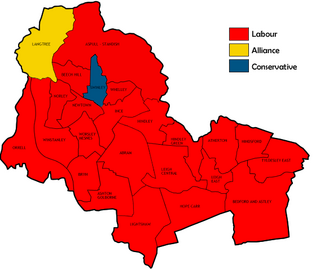
Elections to the Wigan council were held on Thursday, 8 May 1986, with one third of the seats scheduled for re-election. Since the previous election three by-elections had taken place, with Labour gaining the seat being fought in Orrell from the Conservatives as well as holding their seats in Bedford-Astley and Beech Hill. The election seen fewer contestants than any previous election since the council's creation in 1973, with a record of four seats unchallenged. Even amongst those contested there were no minor parties represented, the fewest Alliance candidates since the 1980 election and a record low of Conservative contenders at sixteen. The results were similarly record-breaking as Labour won twenty two seats, with the Conservative and Alliance majorities in their respective heartland wards - and only holds - of Swinley and Langtree reduced to slender majorities. Labour won a high of 65% share of the vote, conversely the Conservatives share fell to a low of 13.1%, with their actual vote dropping into four figures for the first time. Overall turnout rose from the preceding year's underwhelming figure of 29.2%, to a more commonplace 35.8%.

Elections to the Wigan council were held on Thursday, 7 May 1987, with one third of the council up for election. Previous to the election there had been two by-elections held, resulting in a Labour gain of the seat being fought in Swinley from the Conservatives and Labour retaining one of their Hindley Green seats. Participation for this election increased substantially from the previous year's lows. Only one ward went unopposed as Labour reliably provided a full-slate of candidates, the Alliance all but Atherton and the Conservatives up from 16 to 18, by way of fielding candidates in the Labour strongholds of Abram and Worsley Mesnes this time around. An Independent Labour candidate also fought and won Hindley, with an Independent victory last seen in 1976, and Independent representation in 1980, when that same victor failed to survive the re-warding.

Elections to the Wigan council were held on Thursday, 5 May 1988, with one third of the seats up for election as well as an extra vacancy in Beech Hill. Following the previous election, two by-elections had taken place, with the Labour Party successfully defending their seats in Ince and Newtown. This year's election seen an improvement in participation, with all wards fought and five parties contesting in some form, by way of the Greens fielding their first ever slate of four candidates and the return of long-time Communist contender H. Kedward in Leigh Central. Despite this, the number of candidates contesting actually fell by five from the previous year's 64, as the turbulent new merger of the old SDP-Liberal Alliance, Social and Liberal Democrats, fielded just half the number of candidates they'd managed in 1987 and, at 11, the lowest since 1980.

Elections to the Wigan council were held on Thursday, 3 May 1990, with one third of the seats up for election with an additional vacancy in Bryn. Previous to the election there had also been a by-election in Abram, which the Labour Party successfully defended. Despite a wider array of parties - mainly a product from the fractious SLD merger - contesting the election, in several ways it beat 1986's lows in participation. A record of six seats went uncontested as one quarter of the council's wards held no elections, with the Conservatives contesting one half of the wards and the SLD one quarter. The Greens repeated their last year's total of four candidates, but with only two in the same wards as previous. Elsewhere, Independent John Vickers fought his first of many elections in Hindley Green and the respective Social Democrat and Liberal sides opposed to Alliance merging into the SLD fielded a sole candidate each - the latter of which having previously came within a straw of winning Langtree for the SLD.
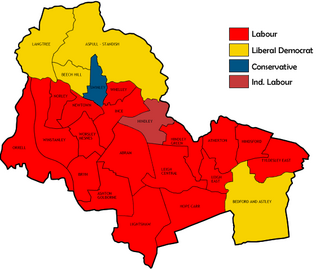
Elections to the Wigan council were held on Thursday, 2 May 1991, with one third scheduled for re-election. Like the last election, this seen a wider variety of party candidates than most previous, but only marginally improved upon the nadir of the year before in terms of candidates, with four wards uncontested, Conservatives fighting just above one half of the seats and the Liberal Democrats just under - although the Lib Dems near doubled last year's total, both were historically disappointing. Minor party participation consisted of three Independent Labour candidates - including a former Beech Hill Labour councillor - two Liberals, a return of an Independent in Hindley Green and one remaining Green - their lowest fielded when participating - in Atherton.
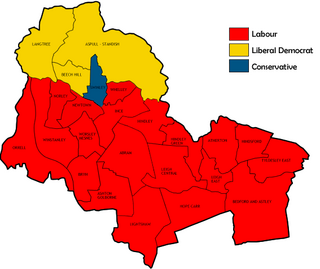
Elections to the Wigan council were held on Thursday, 7 May 1992, with one third of the seats set for re-election. Before the election the Labour Party had successfully retained their seats in three by-elections for the wards of Aspull-Standish, Leigh Central and Norley. The two elections directly preceding 1992's were markedly poor in participation, in contrast this year all wards were fought with the Conservative's and Lib Dem's return to fighting over three quarters of the wards each. Despite this, the election obtained the indisputably worst turnout in the council's near-twenty-year history, at a meagre 23.6%, losing just shy of 12,000 votes from the previous election. The elections were fought one month after the 1992 general election with heavy implications on the results - the most obvious of which is the nationally defeated Labour's loss of 8,000 votes from one year before, and consequently obtaining their worst vote figure in sixteen years. Neither the Conservatives rise - nor the Lib Dem's loss - of around 2,000 each, were significantly removed from recent results or accounted for such a loss, suggesting the slump in turnout were mostly the part of dismayed Labour voters. Seat changes were restricted to two Lib Dems gains from Labour, with one in the Labour-Lib Dem battleground of Aspull-Standish, returning the balance of councillor's in the latter's favour by two to one, and regaining one of their losses in the favourable territory of Langtree.
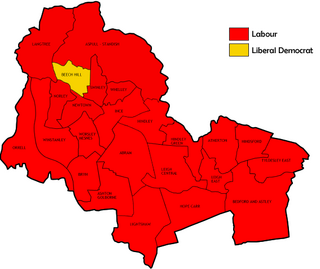
Elections to the Wigan council were held on Thursday, 5 May 1994, with one third of the seats up for election. Prior to the election, Labour had defended their seats in two by-elections for Abram and Hindley. The election suffered from a mixture of a poor contesting rate and low voter turnout. The number of candidates contesting was just 50, the lowest since 1975, with four wards going unopposed, and Lib Dems back to fighting a half of the seats, and the Conservatives less than two-thirds. The only other opposition standing were three Independent Labour candidates, one of which was the previous - but since deselected - Labour incumbent for the seat being fought in Worsley Mesnes. Voter turnout rose from the previous election's nadir, but at 30.4%, still well below average.

Elections were held on Thursday, 4 May 1995, with one third of the seats set for re-election, with an extra vacancy in Leigh East. Ahead of this election Labour had gained the seat being fought in Beech Hill from the Liberal Democrats, and defended a seat in Worsley Mesnes in by-elections. The major parties marginally increased their number of candidates upon last year's totals, whereas the number of Independent Labour candidates fighting returned to just the incumbent in Hindley. Having been the only party opposing Labour in Atherton, the Independent Labour absence there meant that went uncontested this time round, alongside two of last year's unopposed wards, Ince and Leigh Central. In total unopposed wards were reduced from the previous year's four to three. Turnout fell to 26.4%, the second lowest in the council's history, only surpassing the 1992 nadir.

Elections to Wigan council were held on Thursday, 2 May 1996, with an extra vacancy in Abram to be filled. Going into the election there were noticeably fewer candidates than usual, with the total candidate number and the five uncontested wards only narrowly lower than the all-time lows set at the 1990 election. This was mainly caused by the lack of any minor party candidates, and the Liberal Democrat slate dropping by half upon the previous election, to seven - their scarcest outing since their lowest ebb throughout their merger in 1990, but more reminiscent of their patchy participation of the seventies. Turnout had been consistently poor in recent elections, and this election continued the downward trend, dropping below a quarter of the electorate for the second time to 24.2%.
